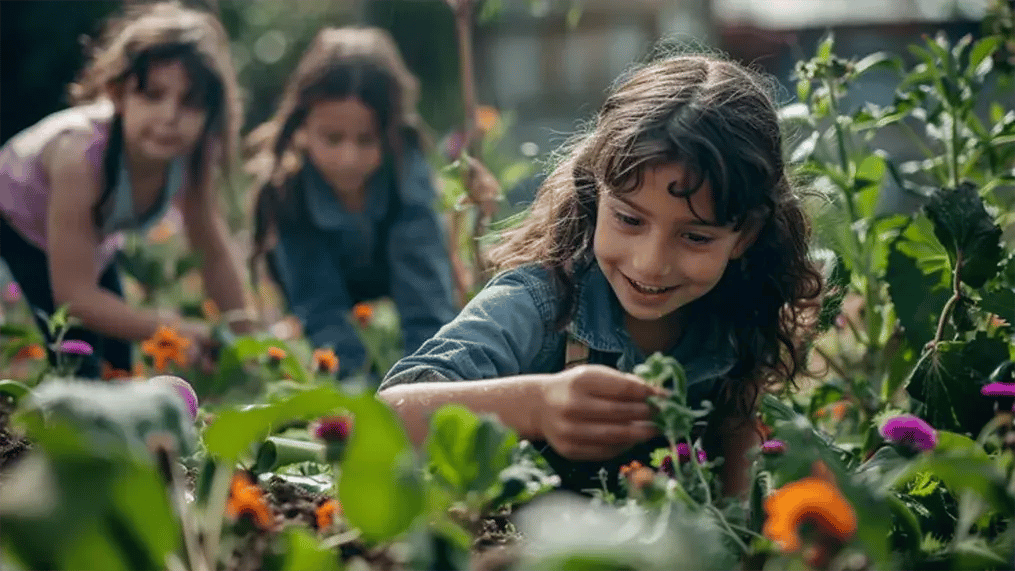Introduction
Gardening is a beautiful and soothing hobby to develop in kids. It not only helps combat stress but also improves their cognition. Lifestyle has changed in the 21st century. No longer do kids get to enjoy their childhood. From the moment they can read and write, they are entered into an academic race that has no end. Their leisure is overtaken by digitalization, be it via video games or cartoons on YouTube. Playing on the open fields is a yearly occasion for them.
But that’s what needs to change because physical activity cannot take a backseat. Even gardening daily for 30 to 60 minutes does wonders for your kids, be it in an outdoors garden or a balcony one. Open air and soil have always been associated with improved health benefits. Engaging in gardening daily will also help kids keep their anxieties at bay. And the cherry on top? Gardening also improves cognitive functioning in kids. Here’s a quick guide on it with tips.
Gardening And Problem-Solving: The Connection

Gardening helps kids learn science and math firsthand from nature, with hands-on experience. From counting the number of seeds, to dividing them according to rows and columns for planting, to providing adequate water to each daily, all of it takes considerable cognitive functioning, focus, and problem-solving skill. By focusing and solving on individual problems as and when they come, kids also develop perseverance and endurance in face of unexpected obstacles. It may not prepare them for everything but can definitely help a lot in various aspects of life in the long run.
Gardening also inculcates mindfulness in kids, meaning they can focus on the present, individual moments and savor them, without worrying about the future. And if they are stuck on a problem, by being mindful and peaceful, your child can develop a fresh, different perspective. This can be achieved through observation and self-reflection, resulting in the much-sought solution. So, gardening helps kids develop problem-solving skills to tackle both academic and real-life obstacles and issues.
Tips On Using Gardening To Develop Problem-Solving Skills In Children

- Let your kids be responsible for certain plants of their choice. They may initially not give it much thought, but later will come to enjoy the activity and watch them thrive.
- Create a mini sensory garden with your kids. Fill it up with swings, lush, tropical plants, heavily scented flowering trees, and beautiful dim lights. This area can be a safe haven for kids, both during the day or night. This will also ensure your kid spends more time outdoors than stewing over anxieties in their room.
- Give your kids mini challenges like using suitable waste materials available at home, like empty crates, used eggshells, old bulbs, plastic watering cans, and more. It is up to them to make it aesthetic and suitable for gardening. If they do it successfully, reward them with new seeds or gardening tools to keep their interest going.
- Let your kids take a nutritional approach to gardening as well. Let them plant herbs of their choice and try them in their dishes. This will also develop their taste buds and develop interest in culinary arts as well.
- Teach your kids math by using plants, pots, tools, and more to teach kids counting, addition, subtraction, multiplication, and division. Once they can read a calibrated ruler, they can even start measuring plant growth before progressing on to measuring the area and perimeter of their flower beds and garden. This will teach your kids real-life applications on math problems.
- Since gardening involves solving various real-life gardening problems like insect infestation, bacterial or fungal infections, and other plant diseases, kids end up learning a lot of botany and pharmacology first-hand.
- Another way of making the most of the gardening experience is by keeping a record of all your kid’s observations and new findings in a nature journal. They can do this themselves by using a scrapbook and note pointers of the new things they learned and sticking pictures of them or sketching them instead. This way, from poison berries to snakes, your kids will have a botanical journal ready to aid them on any garden and life problems.
Conclusion

Gardening is not a magical answer to all problems. That solving capacity needs to exist or developed in kids before it is further nurtured by gardening and Mother Nature. The main purpose of gardening is to expose your kids to various challenges and obstacles in a safe and healthy environment. In that environment, they can make mistakes, learn, and have fun, but only if they are truly interested in gardening. Natural hobbies have a lot of health benefits, both physical and psychological. This ranges from improving heart health and emotional well-being to enhancing mindfulness and lowering stress in kids. However, its benevolent impact on children’s cognitive functioning and problem-solving abilities is worth noting. So, give this guide a try and use gardening to hone your kid’s problem-solving skills.
Kaushiki Gangully is a content writing specialist with a passion for children's nutrition, education, and well-being. With more than five years of writing experience and a science-based background, she provides nuanced insights to help families raise happy, healthy kids. Kaushiki believes in making learning and healthy eating fun, empowering parents with practical, easy advice.
The views expressed are that of the expert alone.
The information provided in this content is for informational purposes only and should not be considered a substitute for professional medical advice, diagnosis, or treatment. Always seek the advice of your physician or another qualified healthcare provider before making any significant changes to your diet, exercise, or medication routines.
References
https://www.whitehutchinson.com/children/articles/downloads/GardeningWithChildren09.pdf
















